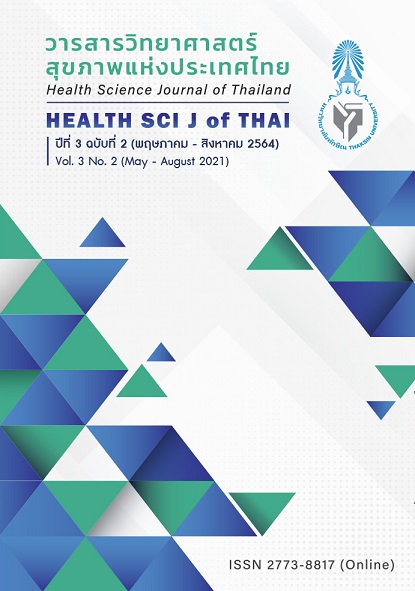Effect of Reducing Salt Consumption Program towards Dietary Consumption Behavior among with Hypertensive Risk Group: A Case study in Nakhon Si Thammarat
Main Article Content
Abstract
This quasi experimental study aimed to investigate effectiveness of reducing salt consumption program towards dietary consumption behavior among hypertensive risk group. The samples were representative of household who aged more than 15 years, being self-cooking or cooking for family members. The study subjects divided into 2 groups: 245 subjects in intervention group and 222 subjects in control group. The intervention group received reducing salt consumption program. The data were analyzed using descriptive statistics, independent t-test and paired t-test. Results showed that subjects in intervention group had statistically significant higher knowledge and perception (p-value <0.001 and <0.001) and had statistically significant lower salty food (p-value <0.001), after receiving program. However, subjects in intervention and control group had not different in consumption behavior. Subjects in intervention group had statistically significantly higher knowledge, perception and consumption behavior (p-value <0.001, <0.001 and <0.001), respectively. In addition, subjects in intervention group had statistically significantly smaller level of salty than control group (p-value <0.001). Results suggested that reducing salt consumption program should be launched in order to modify dietary consumption among risk group and reduce risk of hypertensive illness.
Article Details

This work is licensed under a Creative Commons Attribution-NonCommercial-NoDerivatives 4.0 International License.
References
Health Promotion Policy Research Center, International health policy program. situation NCDs: health crisis, social crisis. Bangkok: Health Promotion Policy Research Center.; 2014. (In Thai)
Apinya, T. The Review of model of prevention NCDs with sodium reduction. Bangkok: The printing office to assist veterans organization.; 2013. (In Thai)
Bureau of Nutrition. Ministry of Public Health. The survey of sodium chloride Intake among people in Thailand. Bangkok: Department of Health, 2009. (In Thai)
Prateepasen, M., Jongsuwat, R., Hattakosol, C. Excessive & imbalance consumption. Bangkok; National Office of Buddhism printery, 2011. (In Thai)
Information and Communication Technology Center Office of the Permanent Secretary. Non Communicable Diseases. [Internet]. 2019. [Cited in 31 March, 2019] Available from: https://hdcservice.moph.go.th/hdc/reports/page.php?cat.
Thai Hypertension Society. Hypertension. [Internet]. 2019. [Cited in 9 May, 2019] Available from: http://www.thaihypertension.org/information.html.
The Bureau of Registration Administration. Official Statistics registration systems. [Internet]. 2019 . [Cited in 20 May, 2019] Available from: https://stat.bora.dopa.go.th/stat/statnew/statMenu/newStat/home.php.
Cohen, J. Statistical power analysis for behavioral sciences. (2nd ed). Hillsdale, NJ: Lawrence Erlbaum Associates, Publishers; 1988.
Chaisongkhram, T. The effect of low-salt diet consumption promoting program on salt consumption behaviors of hypertensive patients. [Internet]. 2009. [Cited in 20 September, 2020] Available from: http://cuir.car.chula.ac.th/handle/123456789/15727.
Moolphate, S. Daily salt intake and factors associated with high salt intake in the community, Donkeaw subdistrict, Chiang Mai province, northern Thailand. [Internet]. 2015. [Cited in 10 July, 2019] Available from: https://hdcservice.moph.go.th/hdc/Reports/page.php?cat.
Boonsiri, C., Piaseu, N., Putwatana, P., & Kantachuvesiri, S. Effects of program promoting food consumption for sodium reduction on knowledge and urinary sodium in nursing students. Thai Journal of Nursing Council 2017; 32(3): 104-119.
Wongchum, R., Chaimoon, C., Kantasen, A., Kansit, R., Juntida, M., Suriwan, S., Jalernsup, W., &Tepsiri, B. The effect of the low salt diet consumption knowledge and behavior among 2nd year nursing students, McCormick Faculty of Nursing, Payap University. Journal of Nurses Association of Thailand Northern Office 2018; 23(1): 21-31.
Assalee, R., Sittipongsakul, S., Supakul, J., &Kaewchantr, M. Effectiveness of the program knowledge. to change food consumption behavior reducing the sugary, fatty and salty foods, sustainable, for the household cooks in U-Thong District, Suphanburi Province. [Internet]. 2015. [Cited in 13 December,2020] Available from: https://www.western.ac.th/media/attachments/2018/03/02/1.pdf.
Panmung, N., Srisawad, K., & Boontawee, P. The experimental study of using the low salt international program in communities. Department of Health Service Support Journal 2020; 16(3): 39-48.
Thangkratok, P., Chookok, S., Mongkoldee, P., Pinrot, P., & Puangpetch, P. Salty eating behavior of aging in Bang-Plad District, Bangkok. KKU Journal for Public Health Research 2016; 9(3-4): 72-78.
Wang, M., Moran, A. E., Liu, J., Qi, Y., Xie, W., Tzong, K., & Zhao, D. (2014). A metaanalysis of Effect of dietary salt restriction on blood pressure in Chinese adults [Internet]. 2014 [Cited in 19 Febuary, 2021] Available from: http://pubmed.ncbi.nlm.nih.gov/260114655/.
Sringernyuang, L., Wongjinda, T., & Apichanakulchai, T. Situation of salt consumption among Thai population [Internet]. 2007 [Cited in 15 July, 2019] Available from: http://thaincd.com/document/file/download/paper-anual/downloadd1no167.pdf.


